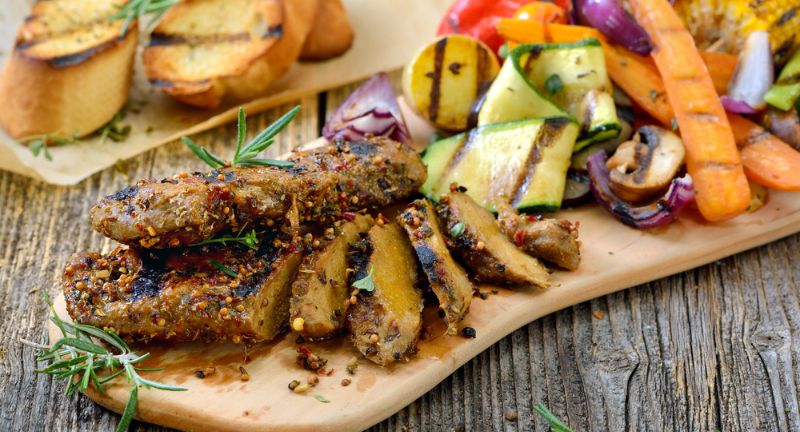FOOD
Plant Power: 20 Vegan Foods Packed with Protein
Published
1 month agoon

Shutterstock
Getting enough protein on a vegan diet is easier than you might think, thanks to the wide variety of plant-based foods that are rich in this essential nutrient. Whether you’re looking to build muscle, support overall health, or simply stay energized, there are countless vegan-friendly options to choose from. From hearty legumes and protein-packed seeds to versatile grains and nutrient-dense superfoods, plant-based proteins can be both delicious and satisfying. Incorporating these foods into your meals not only helps meet your protein needs but also adds a variety of vitamins, minerals, and antioxidants to your diet. Here are 20 protein-rich vegan foods that will keep you feeling strong and nourished.
Lentils

Shutterstock
Lentils are one of the most protein-rich legumes available, offering about 18 grams per cooked cup. They are also high in fiber, which helps with digestion and keeps you feeling full longer. Lentils come in different varieties, such as green, brown, red, and black, each with its own unique flavor and texture. They are perfect for soups, stews, salads, and even veggie burgers.
Chickpeas

Shutterstock
Chickpeas, also known as garbanzo beans, pack about 15 grams of protein per cooked cup. They are extremely versatile and can be used in dishes like hummus, curries, salads, or roasted as a crunchy snack. Chickpeas are also rich in iron, fiber, and essential vitamins, making them a nutritious choice. They can be blended into dips, formed into falafels, or tossed into grain bowls for extra protein.
Tofu

Shutterstock
Tofu is a staple in many plant-based diets, providing about 10 grams of protein per ½ cup serving. Made from soybeans, tofu has a mild flavor that easily absorbs marinades and seasonings. It can be baked, grilled, stir-fried, or blended into smoothies for an extra protein boost. Tofu is also an excellent source of calcium and iron, making it a great meat alternative.
Tempeh

Shutterstock
Tempeh is a fermented soy product that contains about 15 grams of protein per ½ cup. Unlike tofu, tempeh has a firmer texture and a nutty, slightly earthy taste. It’s packed with probiotics that promote gut health and is also a great source of calcium and iron. Tempeh works well in stir-fries, sandwiches, and grain bowls, adding a hearty protein punch to meals.
Edamame

Shutterstock
Edamame, or young soybeans, provide an impressive 17 grams of protein per cooked cup. They are a complete protein source, meaning they contain all essential amino acids. Edamame is commonly served as a snack, lightly salted, or added to salads, stir-fries, and noodle dishes. In addition to protein, they are high in fiber, antioxidants, and essential nutrients like folate and vitamin K.
Seitan

Shutterstock
Seitan, often called “wheat meat,” is one of the highest plant-based protein sources, with about 21 grams per 3 ounces. It is made from gluten, the main protein in wheat, giving it a chewy texture similar to meat. Seitan is excellent for grilling, stir-frying, or adding to sandwiches and stews. While it’s a great protein source, it may not be suitable for those with gluten intolerance.
Quinoa

Shutterstock
Quinoa is a nutrient-dense pseudo-grain that provides about 8 grams of protein per cooked cup. Unlike most plant-based proteins, quinoa is a complete protein, meaning it contains all nine essential amino acids. It has a light, fluffy texture and can be used as a base for salads, grain bowls, and side dishes. Quinoa is also rich in fiber, magnesium, and antioxidants, making it a wholesome addition to any diet.
Chia Seeds

Shutterstock
Chia seeds are tiny but packed with about 5 grams of protein per 2 tablespoons. They are also high in omega-3 fatty acids, fiber, and essential minerals like calcium and magnesium. When soaked in liquid, they expand and create a gel-like texture, making them great for puddings, smoothies, and oatmeal. Chia seeds can also be sprinkled on salads or mixed into baked goods for added nutrition.
Hemp Seeds

Shutterstock
Hemp seeds provide about 10 grams of protein per 3 tablespoons, making them a fantastic plant-based protein source. They have a mild, nutty flavor and can be sprinkled on salads, yogurt, or blended into smoothies. Hemp seeds are also rich in healthy fats, particularly omega-3 and omega-6 fatty acids, which support heart health. Since they are easy to digest, they make an excellent addition to vegan diets.
Pumpkin Seeds

Shutterstock
Pumpkin seeds, also known as pepitas, provide around 7 grams of protein per ounce. They are rich in magnesium, zinc, and healthy fats, making them a nutritious snack option. These crunchy seeds can be eaten raw, roasted, or added to salads, granola, and baked goods. Their high antioxidant content also supports immune health and reduces inflammation.
Almonds

Shutterstock
Almonds are a protein-rich nut, offering about 7 grams of protein per ¼ cup serving. They are also packed with healthy fats, fiber, vitamin E, and magnesium, promoting heart health and skin vitality. Almonds can be enjoyed raw, roasted, or turned into almond butter for a creamy, nutritious spread. They make a great snack on their own or as an addition to oatmeal, salads, or desserts.
Peanuts

Shutterstock
Peanuts are a fantastic plant-based protein source, providing around 9 grams of protein per ¼ cup. They are also high in healthy fats, fiber, and various vitamins and minerals, including biotin and niacin. Peanut butter is a popular, protein-dense spread that pairs well with fruits, toast, or in smoothies. Whether roasted, boiled, or made into butter, peanuts are a versatile and satisfying snack.
Black Beans

Shutterstock
Black beans are a powerhouse of plant-based protein, offering about 15 grams per cooked cup. They are also rich in fiber, folate, iron, and antioxidants, promoting heart and digestive health. Black beans can be used in a variety of dishes, including soups, stews, burritos, and veggie burgers. Their mild flavor and creamy texture make them a versatile staple in vegan cooking.
Green Peas

Shutterstock
Green peas are surprisingly high in protein, with about 8 grams per cooked cup. They are also an excellent source of fiber, vitamins A, C, and K, and important minerals like iron and magnesium. Green peas can be added to soups, salads, pasta dishes, or mashed into spreads. Their sweet, mild flavor and bright color make them a delightful addition to many meals.
Oats

Shutterstock
Oats are a nutrient-dense grain, providing around 6 grams of protein per cooked cup. They are also rich in fiber, particularly beta-glucan, which supports heart health and helps regulate blood sugar levels. Oats can be enjoyed as oatmeal, blended into smoothies, or used in baking for cookies, muffins, and energy bars. They are a budget-friendly, versatile staple in many plant-based diets.
Spirulina

Shutterstock
Spirulina is a blue-green algae known for its impressive protein content, offering about 8 grams per 2 tablespoons. It’s also rich in antioxidants, B vitamins, iron, and essential amino acids, making it a superfood. Spirulina has a strong, earthy flavor and is best added to smoothies, juices, or energy bars. Its nutrient density supports immune health, energy production, and detoxification.
Nutritional Yeast

Shutterstock
Nutritional yeast is a deactivated yeast with a cheesy, savory flavor, providing about 8 grams of protein per 2 tablespoons. It’s often fortified with vitamin B12, which is essential for vegans to maintain healthy nerve function and red blood cell production. This versatile ingredient can be sprinkled on popcorn, pasta, or salads, or used to create vegan cheese sauces. It’s a favorite among vegans for its flavor and nutrient density.
Amaranth

Shutterstock
Amaranth is a gluten-free ancient grain that provides about 9 grams of protein per cooked cup. It’s a complete protein, meaning it contains all nine essential amino acids needed by the body. Amaranth has a slightly nutty flavor and a chewy texture, making it great for porridge, soups, or as a side dish. It’s also rich in fiber, iron, magnesium, and antioxidants, supporting overall health.
Sunflower Seeds

Shutterstock
Sunflower seeds offer about 6 grams of protein per ounce and are packed with healthy fats, vitamin E, and magnesium. They are great for heart health, reducing inflammation, and supporting skin health due to their antioxidant content. These seeds can be eaten raw, roasted, or added to salads, yogurt, or granola for a crunchy texture. Sunflower seed butter is also a tasty, nut-free alternative to peanut butter.
Kidney Beans

Shutterstock
Kidney beans are an excellent source of plant-based protein, offering around 13 grams per cooked cup. They are also rich in fiber, folate, iron, and antioxidants, making them beneficial for heart health and digestion. These beans are commonly used in chili, soups, stews, and salads due to their hearty texture and mild flavor. Proper cooking is essential to reduce natural toxins and enhance their nutritional benefits.
Conclusion

Shutterstock
Incorporating protein-rich vegan foods into your diet is not only easy but also incredibly rewarding for your health. With options ranging from legumes and grains to seeds and superfoods, there’s no shortage of delicious and nutritious ways to meet your protein needs. These plant-based choices offer a variety of flavors, textures, and nutrients that support muscle growth, energy levels, and overall well-being. By mixing and matching different sources, you can enjoy balanced, protein-packed meals every day. So go ahead and explore these vegan proteins to create meals that are both satisfying and nourishing.
Related Topics:

More From Lifestylogy
-


Get Festive With a Hot Chocolate Charcuterie Board!
-


Taco Bell Bringing Back Nacho Fries – with a Surprise…
-


Jaden Smith Opens Food Truck to Feed LA’s Homeless Population
-


Pringles Partners with Fast Food Giant for Tasty New Flavor
-


What Kelly Ripa Eats to Keep Her Enviable Bikini Bod
-


Burger King Offering $5 Coffee Subscription
-


25 Ways To Incorporate More Magnesium Into Your Diet
-


Girl Scout Cookie Flavored Coffees Returning to Dunkin’
-


Best Bedtime Snacks You Won’t Feel Guilty About